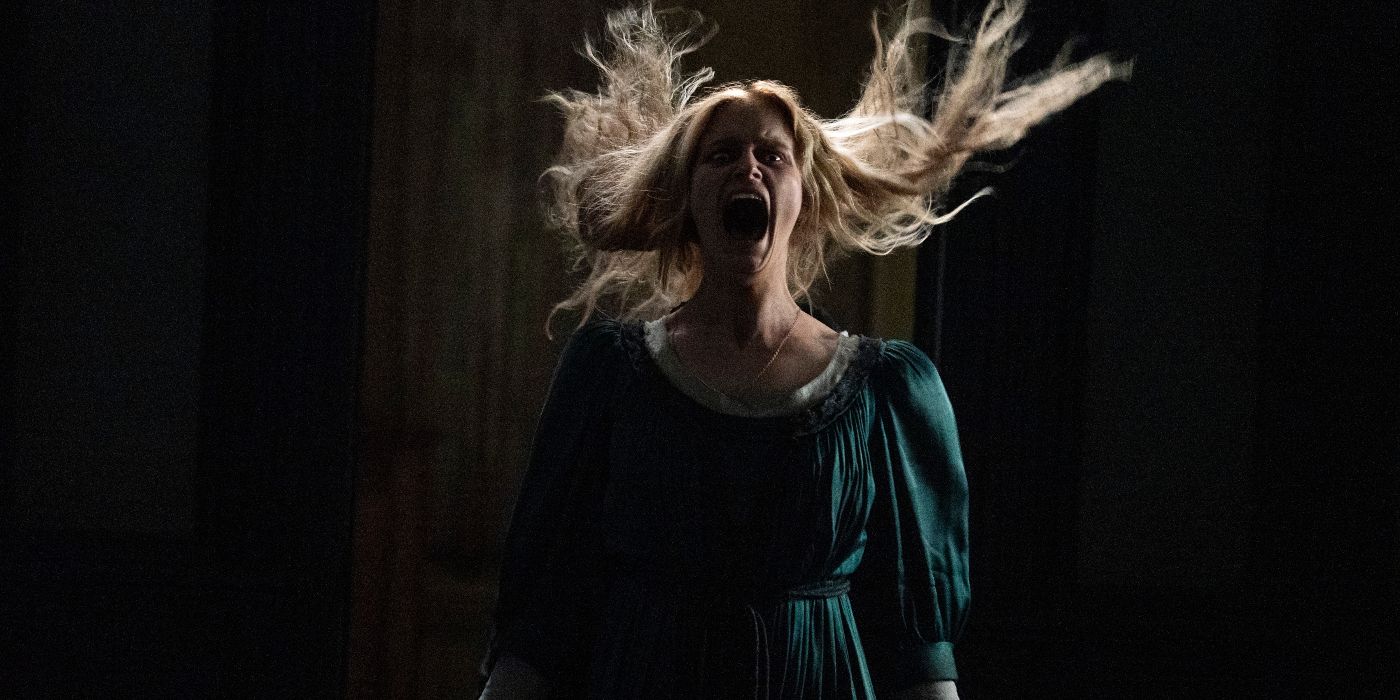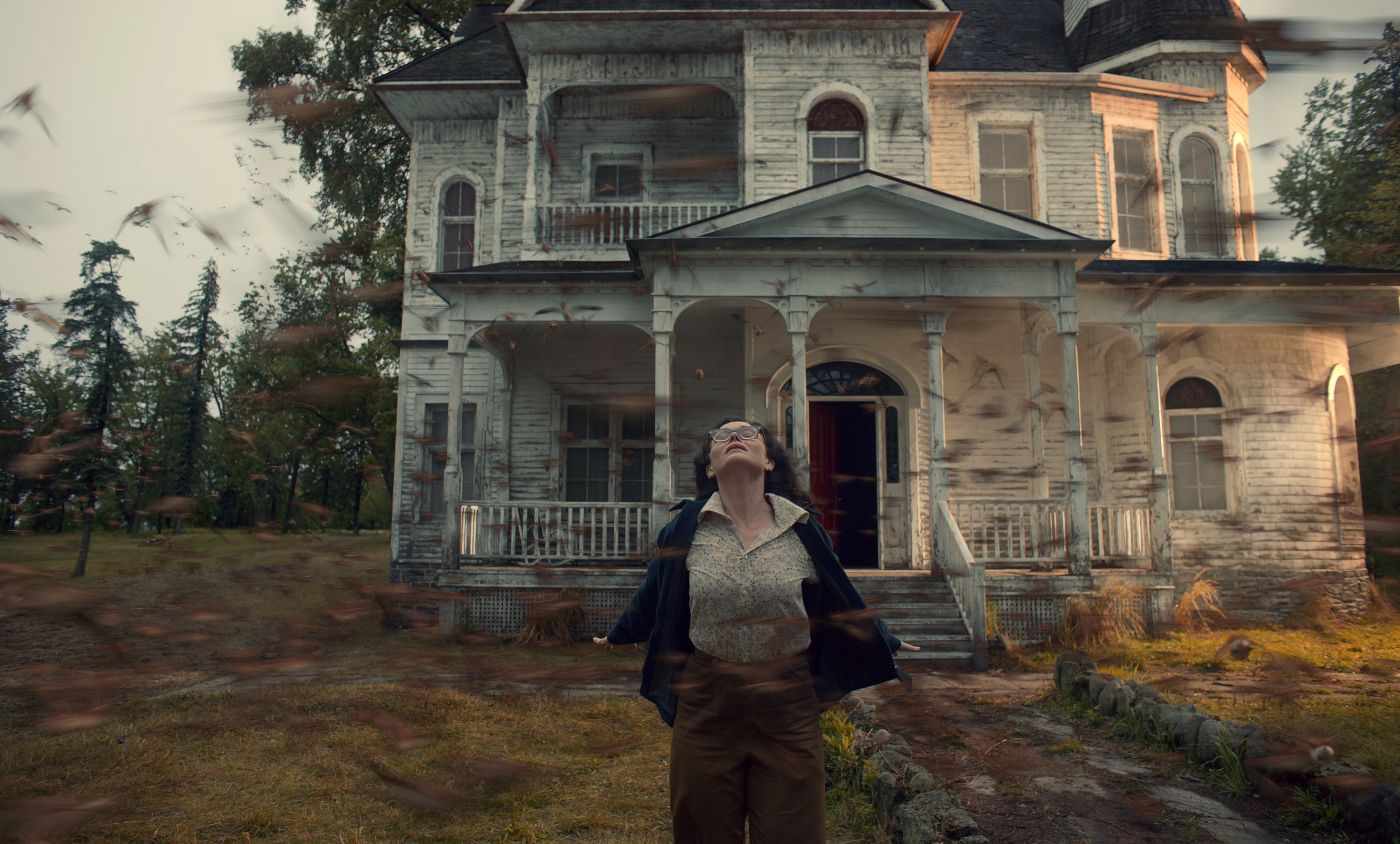Editor's note: The below article contains spoilers for Cabinet of Curiosities episode “The Murmuring.”
The human mind was made to recognize natural patterns, which pushes us to look for meaning even in the most curious behaviors, such as birds’ murmuring and how entire flocks can draw pictures in the sky. Understanding an external phenomenon might also be essential for us to unlock the secrets of what hides deep inside the human soul. “The Murmuring” is about the struggle of a rational mind to comprehend something that might not have a clear explanation. It’s also a gripping story of human trauma and how our pain can leave stains behind, even after we pass away.
In what is arguably the best episode of Guillermo del Toro’s Cabinet of Curiosities, Jennifer Kent (The Babadook, The Nightingale) explores the disruptive power of grief. And while the original story comes from Guillermo del Toro himself, Kent’s screenplay dives deep into the female psyche to explore how women have to deal with twisted social expectations even in the most desperate moments of their lives.
Murmuring Shadows
“The Murmuring” begins at a scientific gathering where Nancy Bradley (Essie Davis) and her husband Edgar (Andrew Lincoln) present their research to their peers. They are both ornithologists dedicated to studying the murmuring, or the patterns created by flocks of birds, through which thousands of individuals can act as a single entity. Nancy and Edgar are excited to share some new images they captured of the murmuring. The event is also put together to thank the couple’s benefactors for funding a new work trip where Nancy and Edgar can study the dunlins from a remote island. Cut away from civilization, the Bradley couple hopes to find new evidence that might help them explain why the murmuring happens and how birds can instinctively know how to fly together in massive flocks.
The year is 1951, which explains why Nancy is the only female researcher in the gathering. And even though her husband insists she’s the mastermind behind their research, Edgar receives all the compliments from their colleagues. The party also takes an uncomfortable turn when one of Edgar’s colleagues says his condolences for the tragedy they’ve survived. As we learn later in the episode, Nancy and Edgar's infant daughter, Ava, died one year before, leaving the couple devastated. The loss of their daughter has also been affecting the couple, as Edgar is ready to move on and try to share good moments with Nancy, but she is still incapable of overcoming her grief.
Nancy and Edgar are ready to sleep in tents while staying on the small island. However, on their way to the island, the property caretaker, Mr. Grieves (Greg Ellwand), reveals he has prepared a house for the couple. As it turns out, the island belongs to a wealthy family, and long ago, they built a single house for their daughter, Claudette (Hannah Galway). The house has been abandoned for decades, but it’s still well-equipped, and since Mr. Grieves cleaned everything he could and ensured everything still works, Nancy and Edgar can enjoy heating, electricity, and tap water. It’s a luxury compared to sleeping in tents out in the cold.
The Bradleys get to the island on October 5, 1951, a Friday. Their only contact with the outside world while they study the dunlins is the weekly visit by Mr. Grieves, who brings supplies from the mainland. In complete isolation, Edgar hopes the experience can also rekindle the romance with Nancy. Unfortunately, they will be pulled apart once Nancy starts to experience supernatural events.
The Grief of Others
Nancy’s connection to the house’s ghost is subtle in the beginning, with a children’s cry recorded in the tape she uses to capture the tweeting and chirping of the dunlins. There are also footsteps in the middle of the night, teasing there might be someone else hidden in the house. But while Nancy is more confident each day that ghosts haunt the house, she cannot bring the subject to her husband because he expects her to have a scientific mind, rational and sharp instead of superstitious.
During their first week in the house, Edgar tries to create intimate moments with Nancy, only to be pushed away. The marriage becomes more complicated as Nancy focuses on solving the house’s mystery instead of working or trying to fix her relationship with Edgar. Edgar feels incredibly frustrated that Nancy seems to care more about the fate of some strangers than about their own dead daughter, for whom the mother was incapable of shedding a single tear in over a year.
Each day, Nancy’s supernatural experiences become more vivid, her fights with Edgar become more intense, and the weight of Ava’s death more obvious. Nancy always fought hard to be recognized as a peer by other scientists, which means being rational instead of emotional. She doesn’t feel the right to be emotional because, as a woman, she knows any reaction might be mistaken for hysteria. That’s why she must first understand the grief of others before dealing with her own.
For a week, Nancy is tormented by visions of Ava on her bed, a boy bloated and dripping water, and a woman screaming in the hallways. The pictures hung on the walls tell the story of a woman who loved a soldier, the father of her child. But Nancy is led by the ghost to a stash of old letters that reveal the soldier was married to another woman and abandoned Claudette when he learned she was pregnant. Alone on the island to hide the family scandal, Claudette felt trapped and dreamed about being free as a bird. It’s not hard to imagine she resented her son somehow, as he’s the cause she was shunned away by her family.
One night, when the kid gets her too angry, Claudette snaps, drowning the boy in the bathtub. Consumed by the guilt of the terrible crime she committed, Claudette jumps from the attic to her death. The boy’s ghost still roams the house, consumed by fear of his own mother. The woman remains trapped on the island, unable to forget she killed her child. Nancy pieces everything together little by little, and once she confirms the truth with Mr. Grieves, one week after arriving at the mansion, she decides to confront the ghosts.
In the night, when Edgar has already left to observe the birds before sunrise, Nancy wanders the mansion until she finds the ghosts. She convinces the boy to step into the light, explaining to him what had really happened in the bathtub. Nancy confronts Claudette in the attic, watching the woman kill herself once more. And even if she doesn’t know if her actions had a positive effect on the ghosts that haunt the house, the whole process allows her to feel the pain of losing a child. She understands Claudette’s despair and why the woman took her own life. She also understands what it’s like to feel trapped for not meeting other people’s expectations. But instead of keeping hiding from the grief, Nancy decides to cry about her deceased child, asking Edgar to talk about Ava with her. It’s a bittersweet ending and another fantastic addition to Kent’s spotless career.



